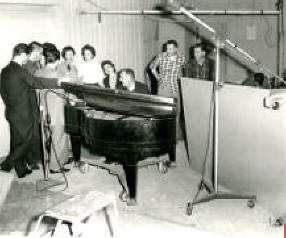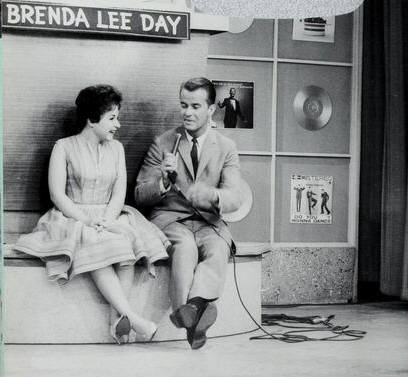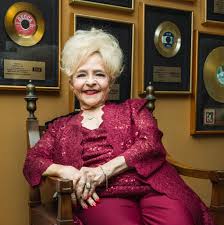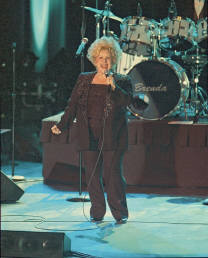
After recording "Dynamite" in 1957 at the age of 12, 4' 9" Lee was given the name Little Miss Dynamite due to her explosive singing style.
Brenda Lee

After recording "Dynamite" in 1957 at the age
of 12, 4' 9" Lee was given the name Little Miss
Dynamite due to her explosive singing style.
Brenda Lee was born Brenda Mae Tarpley December 11, 1944 in
Lithonia, Georgia. She was the second of four children born to
Annie Grayce Yarbrough and Ruben Lindsey Tarpley. She was given
the name Brenda by her mother and was nicknamed "Bootie
Mae" by her father.
In 1949 she began as a child prodigy on the radio in Conyers, Georgia and has been singing professionally since age six. She began a three-year stint on the TV program Ozark Jubilee [later called Jubilee USA] in 1955 and signed with Decca Records the following year. She appeared on television shows in the 50's such as Perry Como Show, Steve Allen Show, and Jack Good's Oh Boy in the United Kingdom. She had some minor hits on the Country & Western charts in the 50's including "One Step at a Time" and "Dynamite." She soon picked up the name of Little Miss Dynamite.
In 1953, Tarpley's father was working a construction job when a hammer fell off a scaffold and struck him on the head. Knocked unconscious, he was brought to a hospital, where doctors performed brain surgery. He died shortly afterward and the family was left "penniless." Her mother began working 14-hour days in a cotton mill to support the family. Tarpley to help provide for the family through her singing gigs. Without a car, they traveled by bus from Lithonia to Atlanta on a weekly basis so Tarpley could perform. A local television producer during this time suggested a stage name because "Brenda Tarpley" was hard to remember. Soon she adopted the stage name "Brenda Lee." Her mother then remarried and her family briefly moved to Cincinnati, Ohio, and Augusta, Georgia. In Augusta, she attended North Augusta Elementary School and junior high school. Her stepfather became her manager in 1955 and booked shows around the Atlanta area.
|
|
Lee's breakthrough came in February 1955, when she turned down $30 to appear on a Georgia radio station to see Red Foley and a touring promotional unit of his ABC-TV program Ozark Jubilee in Augusta. An Augusta disc jockey persuaded Foley to hear her sing before the show. Foley did and agreed to let her perform "Jambalaya (On the Bayou)" on stage that night. At age 11, Foley signed her as a regular cast member of the Ozark Jubilee in 1956. Lee and her mother then traveled by bus to Springfield, Missouri, where she made her debut on the program, singing Williams's "Jambalaya (On the Bayou)".[ Lee's new manager, Lou Black, and her stepfather attempted to get her a recording contract, but were turned down by every label. According to Lee, many companies were hesitant about signing a child performer. Foley then coaxed his Nashville record label to watch Lee perform. Lee was then signed by his company, Decca Records, in May 1956.
Her debut single was, "Jambalaya (On the Bayou)", under the title Little Brenda Lee (9 Years Old). Decca's second single also featured Lee billed under that title. Both the A-side and B-side were novelty Christmas tunes: "I'm Gonna Lasso Santa Claus" and "Christy Christmas". During this time, her Ozark Jubilee performances were seen by New York columnist Jack O'Brien, who wrote an article about her. That led to Lee being booked on The Perry Como Show, The Steve Allen Show, and The Ed Sullivan Show. After a performance at the Nashville Disc Jockey Convention, Lou Black died of a heart attack. She was connected to Dub Albritten, who became her personal manager the same year and remained in that position for many years.

Lee with her producer Owen Bradley, the Anita Kerr Singers, and A
Team studio musicians
photo courtesy Earl Williams
Lee then went to New York City to record her third Decca release, "One Step at a Time". Released in 1957, it became her first US charting single, rising to number 43 on the Hot 100 and number 15 on the Hot Country Songs chart. Its follow-up, "Dynamite", rose to number 72 on the US Hot 100 and gave her the nickname "Little Miss Dynamite". Lee also credited Steve Allen for the nickname after he said it on the air in 1956. In 1958, Lee's production was taken over by Owen Bradley, who served in the role over the next 10 years. The same year and at age 13, she recorded a new Christmas tune called "Rockin' Around the Christmas Tree", which eventually became a top-15 US single in 1960.
|
|
Lee married Ronnie Shacklett, her childhood sweetheart, while still a teenager and they raised two daughters in Nashville, Jolie and Julie.

The song that enabled her to break through in a big way from C&W to pop was "Sweet Nothin's," a top ten hit in 1960 and the first of twelve top ten pop songs she recorded in a four-year span. It was followed by two songs that reached #1 later in 1960 [before she reached her 16th birthday]--" I'm Sorry" and "I Want To Be Wanted. "

In 1960, Albritten brought Bradley the pop ballad "I'm Sorry" for Lee to record. After recording, Bradley believed the song to be a hit, but Decca Records rejected it, theorizing that the song was too mature for Lee to record. Instead, "I'm Sorry" was issued as the B-side to the rock tune "That's All You Gotta Do." "I'm Sorry" became Lee's first US number one single spending three weeks at top spot. "I Want to Be Wanted" It became her second number-one song in the US. A third ballad, "Emotions", reached the US Top Ten in late 1960.
Lee was among pop music's best-selling artists during the early 1960s. Her ballads appealed to teenagers and adults alike. Between 1961 and 1963, nine of Lee's ballads made the top 10. "You Can Depend on Me," "Dum Dum," "Fool No. 1," "Break It to Me Gently," "Speak to Me Pretty," "Everybody Loves Me But You," "Here Comes That Feeling," "All Alone Am I," and "Losing You,"
Decca and her manager further marketed Lee toward straight pop as she neared adulthood, having her appear in supper clubs and record standards Studio LPs like 1962's Sincerely, Brenda Lee targeted adult audiences by centering completely on American Standards.

Lee experienced several personal and professional challenges during the early 1970s. In 1971, Albritten died,and according to Lee, he was supposed to leave her money, but the money was never found and she only had $40,000 in her account. .In addition, she experienced several health problems including vocal cord damage and abdominal issues. She also felt professionally stuck after many production shifts, leading to a reunification with Bradley as her producer in 1971. Song publisher Bob Beckham then brought Lee the Kris Kristofferson-penned tune "Nobody Wins" and she agreed to record it for the newly renamed MCA Records. The song rose to number five on the US country charts in 1973, redefining Lee as a country music artist.
Lee remained identified with the mainstream country genre over the next several years. She made appearances on country-themed television shows such as Hee Haw (1972), presented a country accolade at the 15th Annual Grammy Awards (1973). and had five more top ten country singles between 1973 and 1975. She followed "Nobody Wins" with the number six US country songs "Sunday Sunrise" and "Wrong Ideas."
Through 1976, the singles "Bringing It Back" and "Find Yourself Another Puppet" made the US top 40 chart. Bradley retired and MCA pressured Lee into being produced by Los Angeles-based Snuff Garrett. The resulting album was 1976's L. A. Sessions, which aimed to rebrand her as a 1970s pop recording artist. Its two singles failed to make the pop chart and instead made the US country chart but peaked outside the top 40, leaving Lee disappointed in the album's lack of success. She then traveled to Muscle Shoals, Alabama, to record a disco-oriented project that was ultimately shelved.] Her latest manager, David Skepner, helped her secure a new recording contract with Elektra Records in 1978, which released the single "Left Over Love."
In 1979, Jim Foglesong re-signed Lee to MCA Records. He teamed her with producer, Ron Chancey. Chancey brought in soul music elements to update her sound on the country single "Tell Me What It's Like". Reaching number eight on the US country chart, it became her first top-ten single in nearly five years and received a nomination from the Grammy Awards the next year.
In 1980, Lee also made an acting appearance and performed in the soundtrack for the film Smokey and the Bandit II. MCA coaxed her back into the studio to make a follow-up to Even Better, Take Me Back (1980). The LP was her first in four years to make the US country chart, rising to number 30. It was critically acclaimed for its use of string instrumentation and was positively compared to Anne Murray. Its lead single, "Broken Trust," featured The Oak Ridge Boys and rose into the US country top ten in 1981. Lee then agreed to be part of the soundtrack for Neil Simon's film Only When I Laugh. She recorded the movie's title tune, which was ultimately not included in the film but was featured in the soundtrack. The single version rose into the US country top 40 in 1981 and was the lead release of Lee's 1981 album of the same name.
Lee hosted her own radio show in 1982, Brenda Lee's Country Profile, which featured in-depth interviews with country artists and was on 25 US radio stations. In an effort to save Monument Records from bankruptcy, Lee joined Kris Kristofferson, Willie Nelson and Dolly Parton to record the 1982 compilation The Winning Hand. The album featured new and previously recorded tracks by all four artists, along with solo and duet tracks Lee and Nelson's duet "You're Gonna Love Yourself in the Morning" made the US country top 50 in 1983 while the album made the US country top ten. The four performers then promoted the project in a two-hour television special in 1985. Lee said she was never paid for recording The Winning Hand due to Monument Records' downfall after its release
Between 1982 and 1984, most of Lee's singles made progressively lower US country chart positions. Songs like "Fool Fool," "Enough for You" and "Just for the Moment" reached positions outside the top 40. Believing she needed a production change, Lee teamed up with songwriter and producer Jerry Crutchfield in 1983. She filmed a music video for their first single together, "Didn't We Do It Good" but the song only rose to number 75 Their next release, "A Sweeter Love (I'll Never Know)," made the US country top 30 in 1984 prompting Lee to cut an entire Crutchfield-produced LP. But the project was shelved. Lee said that new MCA president Jimmy Bowen rejected its release. Fearing Bowen would drop her from MCA, in 1984 Lee found a new record producer, Emory Gordy Jr. Bowen gave the Gordy-produced project his blessing and the resulting album, Feels So Right, was issued in 1985. Its uptempo song selection was praised by music critics, but its singles only rose into the US country top 60. Lee believed that its lack of success resulted in her being dropped by MCA in 1986, along with several veteran country artists. She sued MCA in 1988 for $20 million, citing years of unpaid royalties. She settled out-of-court in 1989.

Since Billboard modified its recurrent rules in 2012, Lee's "Rockin' Around the Christmas Tree" has regularly returned to the Billboard Hot 100 since 2015. On the Hot 100 chart dated December 21, 2019, "Rockin' Around the Christmas Tree" reached a new peak of number three in the US with 37.1 million streams and 5,000 digital sales sold. The next week it moved up to #2, where it remained for a second week From 2019 to 2022, the song has re-peaked at #2, blocked from the top position by Mariah Carey's "All I Want for Christmas Is You".
In November 2023, to celebrate the song's 65th anniversary, Lee released a music video featuring her lip-synching to the original recording at a house party with Tanya Tucker and Trisha Yearwood Lee has also joined TikTok to promote the song, where she posts videos reminiscing about its history and success
On the Billboard Hot 100 chart dated December 9, 2023, "Rockin' Around the Christmas Tree" topped the Hot 100 for the first time in the US, becoming Lee's third number-one hit and first since her 1960 single "I Want to Be Wanted". At 78, Lee became the oldest female artist and oldest artist overall to top the Hot 100, feats formerly held by Cher and Louis Armstrong, respectively. The next week, she held the number-one spot, which also meant she surpassed her own age record, having turned 79 during the week ending December 16. After two weeks of number one, on the week ending January 6, 2024, she returned to number one for an additional week.
In December 2024, Spotify revealed that "Rockin' Around the Christmas Tree" is among the top 10 most-streamed holiday songs of all time, with more than a billion streams. The Recording Industry Association of America also certified "Rockin' Around the Christmas Tree" that month for 7× Platinum for US sales of 7 million copies of the digital single.
In December 2024, Lee was honored at the Tennessee State Capitol, where the song was named the Official Holiday Song of Tennessee. Legislation recognizing the song in this way was filed by Tennessee House of Representatives member Jason Powell in December 2023. It passed the state legislature and was signed into law by Governor Bill Lee.

Brenda Lee today
With the writing assistance of Robert K.Oermann and Julie Clay, Brenda Lee issued her autobiography in 2002. The title, appropriately enough, was taken from a nickname that has stuck with Brenda for years: Little Miss Dynamite: The Life And Times Of Brenda Lee.

Performing at her 2002 Rock and Roll Hall of Fame induction
photo courtesy Walden S. Fabry
Brenda Lee was inducted into the Rock and Roll Hall of Fame in 2002.